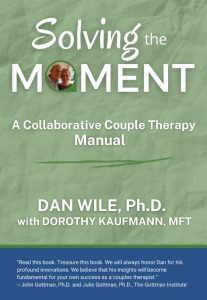As described in previous blog entries, doubling, originally devised by Jacob Moreno, is the featured method in Collaborative Couple Therapy. You speak as if you were one of the partners talking to the other. When doubling for partners in an adversarial cycle, you replace accusations with acknowledgments and outbursts of angry feelings with expressions of vulnerable ones. Suppose, however, a partner doesn’t want at the moment to look at their vulnerable feelings. What do you do then? That’s the question addressed in this blog entry.
Jack (to Anna): You fuss too much with the baby (Jack goes on in this manner for some time).
Dan (doubling for Jack): Jack, I wonder if you’re feeling—here, I’ll be you talking to Anna. And for you, I’d say, “Anna, I miss the alone time we used to be able to have before Ella was born.”
Turning to Jack, I say, “I made that up. If that doesn’t capture how you feel, can you say what does?”
I’m using an example—missing alone time with Anna—to suggest the range of soft underbelly feelings. I’m saying in essence, “Jack, there’s a whole different angle from which to look at this situation—the angle of vulnerable feelings. For example, maybe you miss the alone time you used to be able to have with Anna. If that doesn’t capture how you feel, is there a vulnerable feeling of another sort that does?”
Jack might not want at the moment to talk about vulnerable feelings. He might say, “What I feel is that Anna fusses over the baby too much” or “No, you’ve got it all wrong. It’s what I said, which is….”
But let’s say Jack welcomes the opportunity to confide softer feelings. Turning to Anna, he says:
- “I feel so foolish being jealous of my own son.”
- Or “I miss the intimacy that you get breast feeding Ella. I feel so left out.”
- Or “I wish my mother had been a fraction as concerned about me as you are about Ella.”
He’d be confiding feelings in a way that could jumpstart an intimate conversation.
But is it really such a good idea to skip over Jack’s complaint (“You fuss too much over Ella”) and to suggest the issue is also within him? Couldn’t he feel embarrassed or undercut ? Couldn’t he believe I’m siding with Anna and putting the blame on him? He might. Accordingly, before making my intervention, I ask myself, “Is there a chance that my comment will alienate Jack in a way I can’t easily repair?” If I believe there is, I content myself with a less chancy intervention such as:
Dan: Here, I’ll be you, Jack, talking to Anna. And for you, I’d say, “Anna, I know we disagree about Ella, but don’t you wonder sometimes whether there might be at least a little something to my concern?”
Or:
Dan: Here, I’ll be you, Jack, talking to Anna. And for you, I’d say, “Anna, I wish I had a way to talk with you about Ella that didn’t just lead to an argument—because it’s hard for me to believe I’m entirely wrong about you being overly involved with her.”
I’m getting behind Jack in what he has been trying to say, but recasting it in a manner I hope he’ll appreciate, since he’ll see how it gets a better response from Anna than his more vituperative version. If I stick more closely to what Jack has been saying—if I meet him where he is and pay attention to what he’s trying to express—he may be able to look at his vulnerable feelings, if not immediately, at least later in the session. People need to feel heard in order to listen—and to feel safe enough to confide their vulnerable feelings or even just recognize that they’re having them.



How would you handle Anna in this case if she saw his vulnerability and your speaking for as a weakness and a turn off? At times I find one person in the couple is so turned off by their partners perceived lack of authenticity as a real block.
I might say, “Oops Jack, it looks like I got you into something.” Or I might say for Anna, if I thought it would resonate with her, “Jack, I know it’s not fair–I feel bad that I feel it–but I’m having a negative rather than positive reaction to your opening yourself up in that way.”
Nice piece. Doubling is potent stuff; I appreciate you modeling ways to dial it down.
Hi Dan, thanks for another great blog. I love using doubling as it frees up communication and understanding like nothing else, however I did learn the hard way that I have to be careful to not simply re-state a partner’s complaint.
On reflection I became hooked into the countertransference and I gave voice to some of her stored up feelings by saying “I feel angry about your shutting down” and then I had to then work hard to repair things with the husband, who felt ganged up on (and not helped with his loss of voice!).
Since then I’ve been very careful to ensure that I’m revealing the vulnerability, and on the occasion above I wish I could have revealed her vulnerability behind her anger. It’s a learning process I guess! Thanks gain, Tim
Dan,
Another important contribution. I really liked that you put this proviso on the map. For me, it means going slower and tracking more closely what the person has ACTUALLY SAID before suggesting deeper, more hidden or defended issues. Very sensitive of you, as always.
–Art
The more modest rephrasing is surely easier for Jack to get on board with. If feeling vulnerable is a core issue for Jack he won’t want to have it zipped open in one sweep. Approaching it ever so respectfully as his concern about how to talk to Ann in that moment is much less threatening. Beautiful example of how less is often more. Thanks again, Dan!
Thanks Dan,
This is a great little vignette. And my comments may be repetitive from other blogs as I am new here.
In my training I was taught and use doubling usually when the person I am doubling or working with, is stuck in such a manner that they lose their confidence or feel immediately undermined. So I double, or get doubling done, when they feel ‘defeated’ usually highlighted by a dropping of shoulder, a going quiet with the voice etc. The result is the return of confidence and capacity to continue on their own. This training was based on the psychodramatic idea of ‘doubling’ also being a stage of development, and if the person had inadequate doubling then they likely could not sustain their own warm-up to the issue at hand. This is when it is a required technique in a psychodrama.
However, using at you have described here, as both an educational and sensitive intervention, I think that you have described a great process and described it well.
Do you often use the double-bind variation that Ann Hale used to teach – helping each person to stand behind their partner and double them. And then make sure they both try this out. I’ve used it a few times and it is not easy for either partner but it improves their capacity to double in normal life.
Thanks for this and for the focusing on the relationship side rather than the ‘just getting it right’ side.
Cheers
Peter
I like your talking about his vulnerability and all those
feelings make sense around her feeding the baby.
Thank you for the cautious note. I appreciate how you take the words spoken and validate his concern that she’s over doing things. I believe that’s a voice couples shy away from a it could come across critical and selfish but you present it as sensitive and curious. A helpful lesson in structuring an intervention. Great.